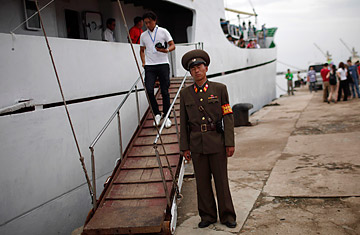
A North Korean soldier stands next to the Man Gyong Bong cruise ship at the Rason special economic zone in North Korea on Aug. 30, 2011

This post is in partnership with Worldcrunch, a new global-news site that translates stories of note in foreign languages into English. The article below was originally published in Die Welt.
Aboard the Man Gyong Bong, fresh coffee was served, along with dried fish and local beer. Karaoke parties pepped the night life.
That said, turn on a faucet and there was usually no water — and cabins were more like dormitories. Welcome to North Korea's first cruise ship.
If all goes according to the plans of North Korean authorities, the 21-hour cruise on the converted freighter from the down-at-the-heels port city of Rajin to the northeastern part of North Korea, which is known for its scenic Mount Kumgang, will boost tourism and provide this isolated country with an immediate injection of much needed foreign currency.
To promote the project, North Korea's usually publicity-shy regime invited foreign journalists and Chinese tour operators on a beta-test tour.
For the cruise, authorities spruced up a nearly 40-year-old freighter, which, until 1992, ferried between North Korea and Japan. "The conversion work on the ship was only completed a week ago," said Hwang Chol Nam, deputy mayor of the Rason special economic zone.
The cruise idea was hatched by Taepung, a North Korean investment group, and the regional government of Rason. In 1991, the whole area on the northeast coast of North Korea that borders Russia and China, including the cities of Rajin and Sonbong, was declared a free-trade zone in order to stimulate investment. However, because of poor infrastructure, frequent power outages and a lack of confidence induced by a Stalinist-era management style, foreign investors stayed away and the zone never took off.
Now, the authorities are trying anew to infuse life into the project. North Korea's economy is suffering bitterly because of international sanctions imposed on the totalitarian state over its nuclear-weapons program.
After decades of isolation and bad economic policies, the country is desperately poor and its population has to cope with constant food shortages.
According to Hwang, the way forward in the zone is a mix of tourism and seafood processing.
Gradually, North Korea is opening to Western visitors. Presently, only the Mount Kumgang area has been developed for tourism — although there is a considerable political conflict in the region after a North Korean soldier shot a vacationing South Korean in 2008.
On our tour at the end of August, when the Man Gyong Bong left Rajin, hundreds of students and workers with flowers saw off the ship.
Any contacts with local people took place only with guides, owners of tourism companies or hotel employees. Out the window of the excursion bus, North Koreans could be spotted, in monotone clothes, cycling by or driving one of the rare cars on otherwise empty roads.
Portraits of Kim Jong Il and his deceased father Kim Il Sung adorned the vast lobby of the hotel in Rajin. The rooms were spartan but clean. Internet connections were not available, and connection by telephone was unreliable and expensive.
Passengers who decided to go onshore had to hand over their cell phones to cruise managers. According to Hwang, telecommunication in the free-trade zone will improve shortly and Internet access — albeit only to websites relating to the local economy — should be available later this month.
For Simon Cockerell, managing director of Beijing-based Koryo Tours, a company that specializes in North Korea travel, the attractiveness of the tour lies in the fact that the destination is utterly obscure. "Lots of people love to travel to unknown places," he says. "And this is the least visited part of the least visited country on the planet."
Read the original article in German.
Also from Worldcrunch:
Rage and Diplomacy: Has Israel Lost Its Last Allies in the Muslim World?
— Süddeutsche Zeitung
— Die Welt
Experts on the Take: Dissecting a Chinese Penchant for Fraud in High Places
— Economic Observer
